★★½
“To lose one partner may be regarded as a misfortune; to lose two looks like carelessness.”
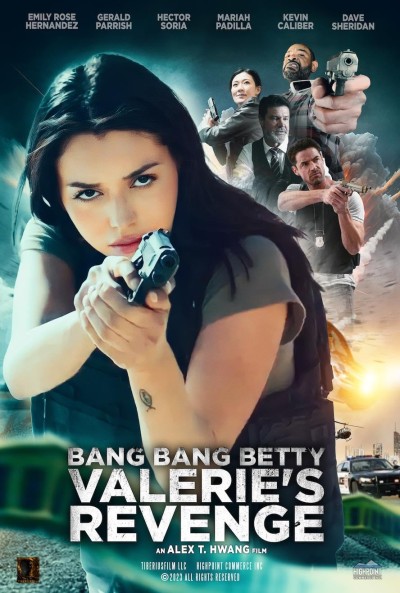 This one ends by informing us definitively that “Bang Bang Betty will return.” The statement may cause some confusion to viewers in this installment, because Bang Bang Betty is not present to begin with. No, this sequel to Bang Bang Betty is entirely Betty-free, without any real explanation as to why. I can only presume the actress involved was otherwise engaged. Instead, it focuses on Valerie Mendez (Hernandez), who was a prosecuting attorney in the first one, but now seems to be an undercover detective. She is investigating the drug trafficking activities of Sanchez (Soria), when her partner and fiancee, Beatriz, is killed in a gun-battle with Sanchez and his men.
This one ends by informing us definitively that “Bang Bang Betty will return.” The statement may cause some confusion to viewers in this installment, because Bang Bang Betty is not present to begin with. No, this sequel to Bang Bang Betty is entirely Betty-free, without any real explanation as to why. I can only presume the actress involved was otherwise engaged. Instead, it focuses on Valerie Mendez (Hernandez), who was a prosecuting attorney in the first one, but now seems to be an undercover detective. She is investigating the drug trafficking activities of Sanchez (Soria), when her partner and fiancee, Beatriz, is killed in a gun-battle with Sanchez and his men.
This forms the dramatic impetus for the rest of the film, in which Valerie goes after Sanchez. Though since in this installment, we go from cold open to lesbian canoodling in under two minutes, then Beatriz getting fridged before the ten-minute mark, the emotional impact on the audience is limited. It does solve the purpose of justifying the title. Valerie then seeks vengeance in ways which don’t exactly stand up to scrutiny in terms of police procedure, to the point where “international incident” might be closer to the truth. Her motto appears to be ,”You can’t spell jurisdiction without I and N-O”, charging across the border into Mexico with help from her replacement partner, and DEA agent Richard Cross (Caliber), whose partner also fell victim to Sanchez. What are the odds?
I’ve a feeling this might have been filmed back-to-back or close to with its predecessor, and has many of the same strengths and weaknesses. The performances are decent, with a special shout-out to Padilla as Sanchez’s brutal henchwoman, Lola. The action is a bit up-and-down, and we never get to see the brawl between Valerie and Lola that I was expecting – and, to be honest, anticipating. It’s Cross who ends up getting that, and the film does nothing to defray the usual problems when there’s such a size discrepancy between opponents. The CGI blood remains as poorly-executed as before, which does the entire movie a disservice, leaving it looking cheap and rushed.
It’s a shame, because there are occasional moments which are genuinely impressive. For instance, a well-staged shot of Valerie cradling the dying Beatriz in her arms, while the gunfight goes on in slow-motion behind them. Or the unexpected Debussy which pops up on the soundtrack, as she raids one of Sanchez’s drug houses. These are moments which are likely better than anything in its predecessor. However, they are countered by the weakness of a plot which feels very much a downgrade: it’s implausible at best, and too often topples over into ridiculous. Overall, it comes in at the same grade, and I find myself, once again, cautiously looking forward to a third installment. Hopefully, this time the plot will receive as much effort as the characters.
Dir: Alexander T. Hwang
Star: Emily Rose Hernandez, Hector Soria, Kevin Caliber, Mariah Padilla





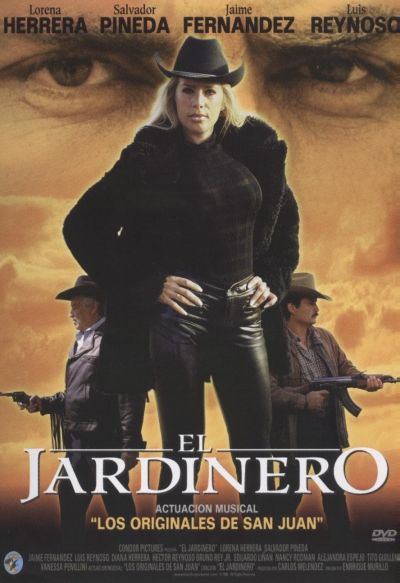 Well, that only took… twenty-one years. Back in 2003, I watched and reviewed
Well, that only took… twenty-one years. Back in 2003, I watched and reviewed 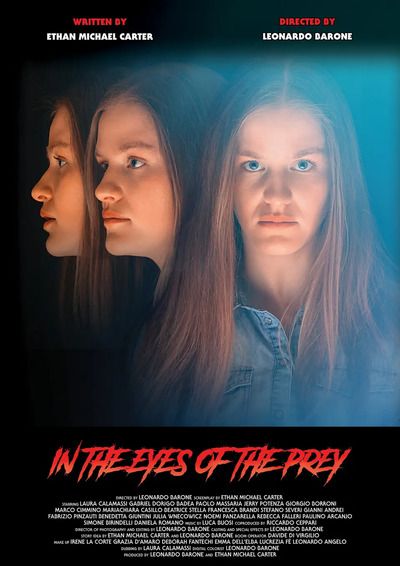 New rule. If ever I become an evil, kidnapping overlord, I shall be sure not to leave potentially lethal power-tools left lying easily accessible, around the place where the abductee is being kept. This is just one of the many mistakes made by the criminals here, in what could be an instructional guide on how NOT to execute a kidnapping. Admittedly, they weren’t aware that their victim suffers from multiple personality disorder. The alternate version is more than happy to wield the aforementioned power-tool – specifically, a nail gun – with extreme prejudice. It helps that these grown men and hardened criminals make it remarkably easy, for a 110-lb woman to overpower them in various ways.
New rule. If ever I become an evil, kidnapping overlord, I shall be sure not to leave potentially lethal power-tools left lying easily accessible, around the place where the abductee is being kept. This is just one of the many mistakes made by the criminals here, in what could be an instructional guide on how NOT to execute a kidnapping. Admittedly, they weren’t aware that their victim suffers from multiple personality disorder. The alternate version is more than happy to wield the aforementioned power-tool – specifically, a nail gun – with extreme prejudice. It helps that these grown men and hardened criminals make it remarkably easy, for a 110-lb woman to overpower them in various ways.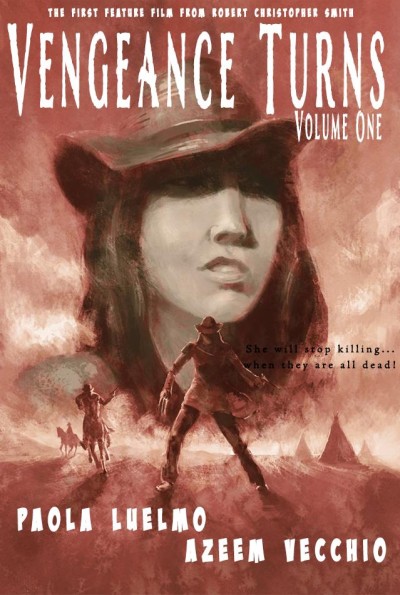 The film opens with a caption, “The first feature film from Robert Christopher Smith,” and it’s largely superfluous. Because, to be brutally honest, you can tell. It’s filled with choices which virtually scream, movie-making debut. That it’s a passion project for Smith is clear, and the persistence with which he pursued his vision is clear, and highly laudable. Perseverance can only take you so far, however, and is no substitute for skill and experience. It does feels this was a learning experience on the fly, with a palpable improvement over its course, and Smith left the production a significantly better film-maker than he came in, I suspect. At least it does tell a fairly complete story (glares over at
The film opens with a caption, “The first feature film from Robert Christopher Smith,” and it’s largely superfluous. Because, to be brutally honest, you can tell. It’s filled with choices which virtually scream, movie-making debut. That it’s a passion project for Smith is clear, and the persistence with which he pursued his vision is clear, and highly laudable. Perseverance can only take you so far, however, and is no substitute for skill and experience. It does feels this was a learning experience on the fly, with a palpable improvement over its course, and Smith left the production a significantly better film-maker than he came in, I suspect. At least it does tell a fairly complete story (glares over at 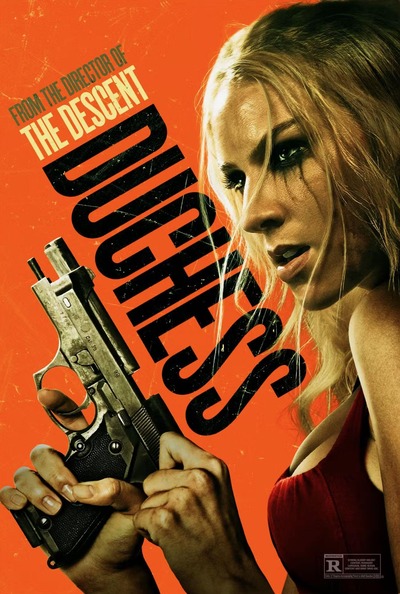 Marshall has been involved in our genre back to 1998, when he wrote
Marshall has been involved in our genre back to 1998, when he wrote 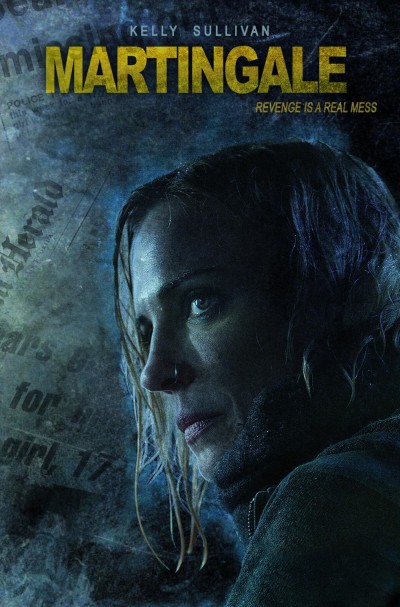 It’s probably symptomatic of… something, that the film’s title is never explained. With the main character working in a casino, I presume it’s a reference to the Martingale betting system, where you basically double your bet after every loss. It guarantees a profit – unless you hit such a long losing streak you run out of money entirely. Its relevance here is uncertain, and I doubt most viewers would know what a martingale is either. But then, the film is very good at not explaining stuff. Another example would be, what the scam is supposed to be with Andi (Sullivan) collecting left-behind cash-out casino slips and handing them to a collaborator, Whit (Melikhov). These are for trivial amounts, so why bother?
It’s probably symptomatic of… something, that the film’s title is never explained. With the main character working in a casino, I presume it’s a reference to the Martingale betting system, where you basically double your bet after every loss. It guarantees a profit – unless you hit such a long losing streak you run out of money entirely. Its relevance here is uncertain, and I doubt most viewers would know what a martingale is either. But then, the film is very good at not explaining stuff. Another example would be, what the scam is supposed to be with Andi (Sullivan) collecting left-behind cash-out casino slips and handing them to a collaborator, Whit (Melikhov). These are for trivial amounts, so why bother?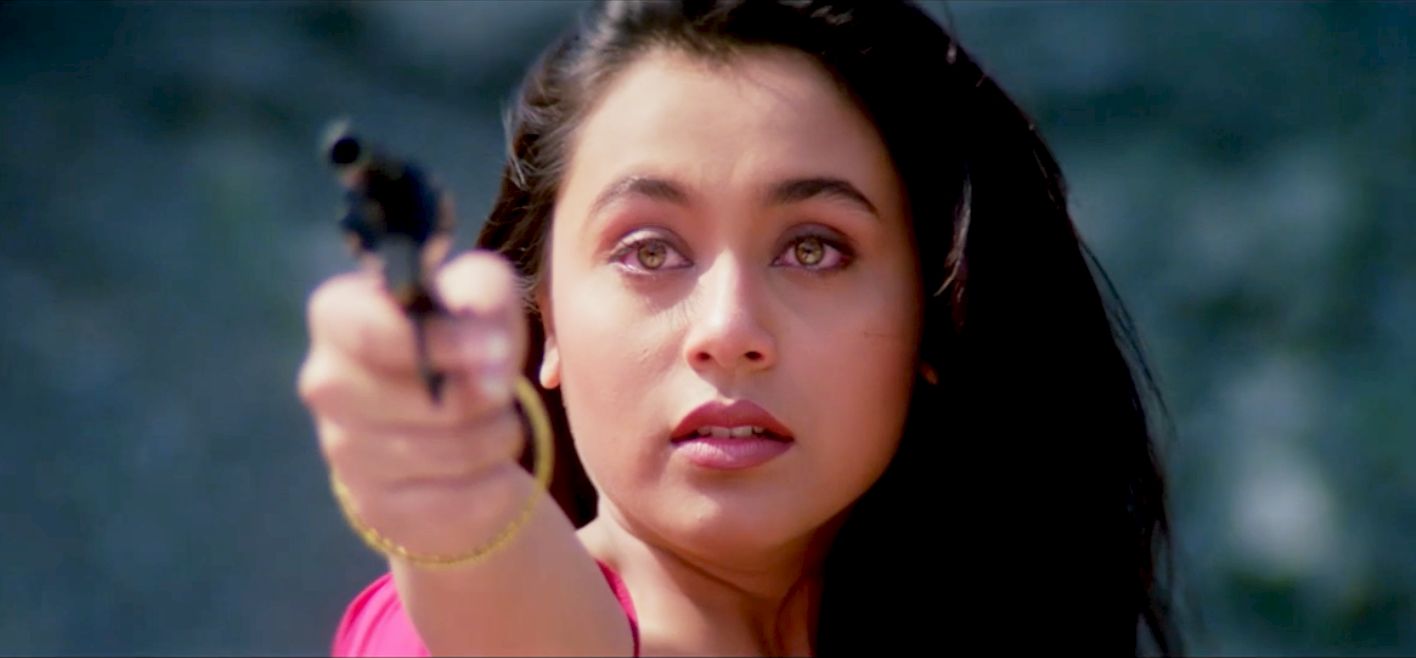 ★★½
★★½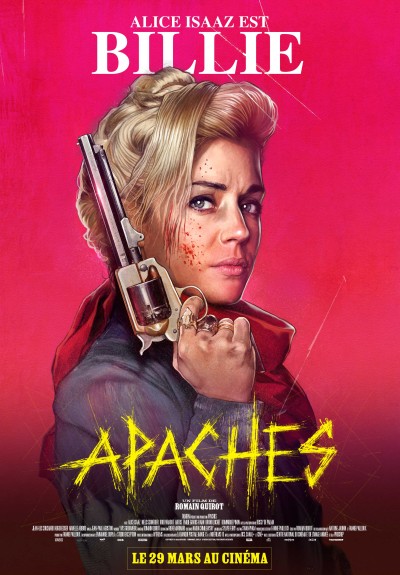 I guess the title is trying to riff off Gang’s of New York, though this is set significantly later. It begins in 1884, when the Apache gang run the Parisian underworld. Young orphans Billie, Paulie and Tricky are on the fringes, until Tricky is killed when forced to play Russian roulette by the gang’s leader, Jésus (Schneider). Billie is framed for the death by a corrupt cop, and spends fifteen years in jail. When she gets out, now a grown woman, Billie (Isaaz) seeks revenge on all those responsible for Tricky’s death, infiltrating the Apaches to get close to Jésus. Matters are complicated, by the presence in the gang of Paulie (Paradot), who was brought up by Jésus, and also by the seductive nature on her of the Apache lifestyle.
I guess the title is trying to riff off Gang’s of New York, though this is set significantly later. It begins in 1884, when the Apache gang run the Parisian underworld. Young orphans Billie, Paulie and Tricky are on the fringes, until Tricky is killed when forced to play Russian roulette by the gang’s leader, Jésus (Schneider). Billie is framed for the death by a corrupt cop, and spends fifteen years in jail. When she gets out, now a grown woman, Billie (Isaaz) seeks revenge on all those responsible for Tricky’s death, infiltrating the Apaches to get close to Jésus. Matters are complicated, by the presence in the gang of Paulie (Paradot), who was brought up by Jésus, and also by the seductive nature on her of the Apache lifestyle. 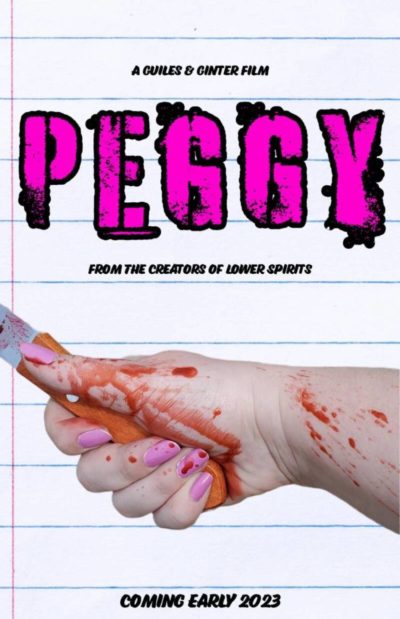 An early contender for widest gap between synopsis and reality in 2024. On the one hand, we have “After years of torment, Peggy finally gets revenge on all those who wronged her in the past.” On the other? A dumb, microbudget not-a-horror, not anything really. It’s probably most notable for the unexpected appearance of Tom Lehrer on the soundtrack. I guess the basic concept is there. Peggy (Van Dorn) is almost thirty, but still lives at home with her doting dad (Williams). Her main hobby is abducting and torturing those who “wronged her” – though quite what they did to deserve such punishment is never made clear, which makes it kinda hard to feel empathy for her.
An early contender for widest gap between synopsis and reality in 2024. On the one hand, we have “After years of torment, Peggy finally gets revenge on all those who wronged her in the past.” On the other? A dumb, microbudget not-a-horror, not anything really. It’s probably most notable for the unexpected appearance of Tom Lehrer on the soundtrack. I guess the basic concept is there. Peggy (Van Dorn) is almost thirty, but still lives at home with her doting dad (Williams). Her main hobby is abducting and torturing those who “wronged her” – though quite what they did to deserve such punishment is never made clear, which makes it kinda hard to feel empathy for her.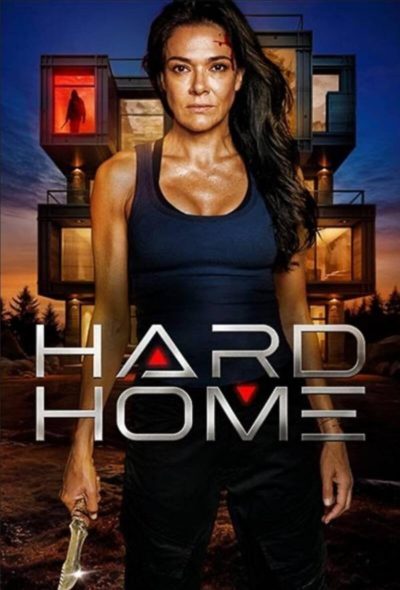 Mary (Kessell) has a grudge, and probably with good reason, I’d say. Because the serial killer known as Diablo killed her daughter, Kelly, in a particularly brutal manner – finishing his victim off by burning her alive. With the help of information provided by FBI Agent Selena Wall (Adedeji), Mary puts the pieces of the case together, and eventually lures Diablo (Howard) into attacking her, then brings him back to her house. This has been turned into a hi-tech, maze-like warren designed to force Diablo to confront all his crimes, and in particular his murder of Kelly. Naturally, things don’t quite go as intended. Expecting rational, predictable behaviour from a serial killer was probably a mistake by Mary, despite her technological advantages.
Mary (Kessell) has a grudge, and probably with good reason, I’d say. Because the serial killer known as Diablo killed her daughter, Kelly, in a particularly brutal manner – finishing his victim off by burning her alive. With the help of information provided by FBI Agent Selena Wall (Adedeji), Mary puts the pieces of the case together, and eventually lures Diablo (Howard) into attacking her, then brings him back to her house. This has been turned into a hi-tech, maze-like warren designed to force Diablo to confront all his crimes, and in particular his murder of Kelly. Naturally, things don’t quite go as intended. Expecting rational, predictable behaviour from a serial killer was probably a mistake by Mary, despite her technological advantages.